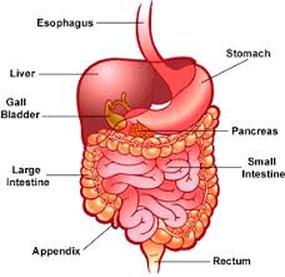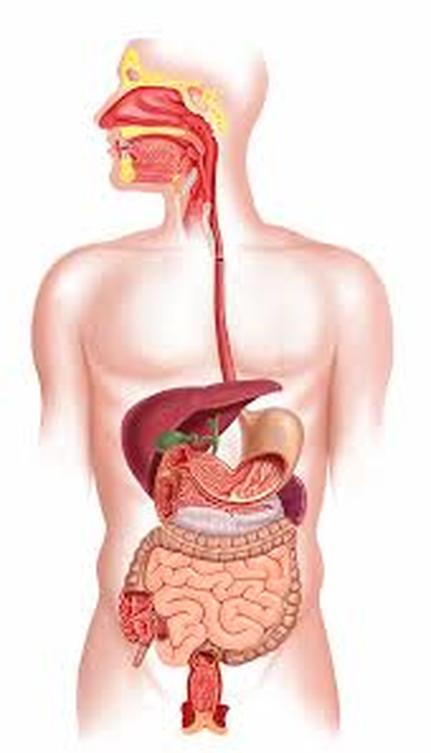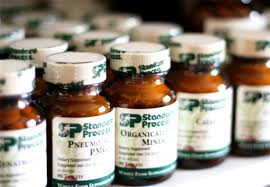Digestive Health
|
|
If you suffer with a digestive ailment or discomfort, you are not alone! Digestive issues are very common and can range anywhere from mild disturbances to severe conditions, affecting daily well-being, lifestyle, and social activities. Not only are these symptoms inconvenient, but poor digestion can lead to vitamin and mineral deficiencies impacting your long term health. A healthy digestive system is also one of your first lines of defense against pathogens (such as bacteria, yeast, and parasites). Maintaining a robust digestive system is very important; in fact your health depends on it!
|
Poor Digestion Affects More Than Just The Gut!
Digestive issues can impact many areas of your health. Pain or discomfort may affect sleep and mood. Poor absorption affects overall nutrition and consequently your energy levels. Gut health affects immunity and allergic response. Constipation increases re-absorption of toxins not being eliminated by bowel movements. These imbalances often show up as conditions of the skin as well. Indeed proper digestion is a primary factor in maintaining the many facets of health.
What Is Causing My Digestive Issues?
Your digestive issues may be caused by a number of factors. It is often a combination of these factors that leads to symptoms, making us finally take notice and realize there is a problem. Contributing factors include:
|
Diet
|
Invasive Procedures
|
The Long List Of Digestive Ailments

With increasing stressful lifestyles and less reliance on healthy home cooked meals the list of digestive conditions seems to be ever-growing: abdominal pains, acid reflux (GERD), autoimmune conditions, bacterial overgrowth (SIBO), bloating, blood in the stool, bowel obstruction, Candida overgrowth, Celiac’s Disease, constipation, Chron’s Disease, colitis, cramping, cysts, diarrhea, diverticulitis, excessive belching or flatulence, food sensitivities or food allergies, gallstones, heartburn, hiatal hernia, indigestion, insufficient stomach acid, irregular bowel movements, Irritable Bowel Syndrome (IBS), leaky gut, nausea, pancreatitis, Parasites (amoebas, flukes, worms), polyps, stomach pains, tumors, ulcers, Ulcerative Colitis, vomiting, etc.
How Do Natural Therapies Compare To Conventional Treatment?
Natural therapies have a lot to offer. In comparison to conventional treatment, natural therapy is less invasive, typically doesn’t require expensive labs or diagnostic procedures, and doesn’t involve ongoing drug therapy. Pharmaceutical medications often suppress function and mask symptoms. While they may provide relief short term they often cause further imbalances in the long run. Natural therapies, on the other hand, seek to restore proper physiological functioning so that the body may recover its natural state of balance.
Although natural therapies may be considered “Alternative Medicine”, these approaches have a much longer history than conventional medicine, are safer with less side effects, and are often more effective.
Although natural therapies may be considered “Alternative Medicine”, these approaches have a much longer history than conventional medicine, are safer with less side effects, and are often more effective.
What Natural Therapies Treat Digestive Issues?
- Diet Modification and Food Therapy
- Nutritional Supplements and Herbal Medicines
- Acupuncture
1) Diet Modification and Food Therapy
This is the gentlest approach and is indicated for new or mild conditions or for prevention and health maintenance. Diet modifications may be required as a prerequisite for the other therapies (herbs, supplements, and acupuncture) to work most effectively.
|
2) Nutritional Supplements and Herbal Medicines
These substances work especially well because they come into direct contact with the digestive system when they are ingested. Although herbs and supplements are natural, they can have a powerful effect. Improper treatment can worsen health conditions, therefore it is important to make sure the correct medicines are chosen. It is recommended that herbs and natural supplements be prescribed by a competent holistic health practitioner. The categories of therapeutic action that may be utilized include: |
3) Acupuncture
|
|
Acupuncture is a time tested therapy that has proven effective. Acupuncture works through various physiological mechanisms beginning with direct stimulation of the body tissues themselves. This stimulation brings blood flow and triggers various neurological and chemical responses. The results are regulation of both the nervous and endocrine systems. Physiological responses that have been identified include the release of serotonin and other endorphins (nervous system), increased white blood cells and Immunoglobulins (immune system), increased gastrin and D-Xylose (digestive system). Acupuncture has also been shown to have a regulatory effect on peristalsis, increase T-Lympocytes, prostaglandins, gamma globulins, and anti-body levels explaining its overall effectiveness in treating a broad range of conditions.
|
Acupuncture has been recognized by both National Institute of Health and The World Health Organizations as effective treatment for numerous digestive conditions. Clinical studies and other probable evidence exist for the following conditions:
|
|
|
On The Road Back To Good Digestion
Good digestion is the foundation of health. When digestion gets off track it may require the expertise of a qualified healthcare provider. Through the course of gathering your health history and a detailed exam, a well directed treatment plan can be developed. Regaining health may require changes in your diet and lifestyle, recommended herbal and nutritional supplements, and acupuncture. Even chronic conditions can respond fairly quickly with natural treatment geared toward restoring proper physiological functioning. Contact us today to get started back on the road to health! |







